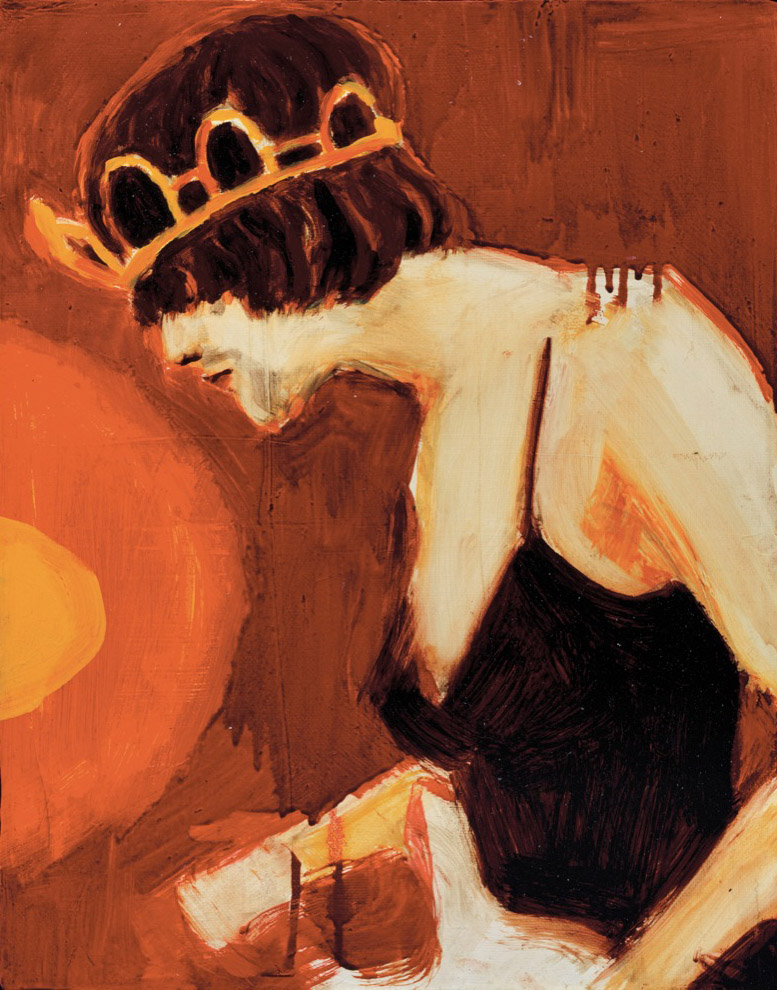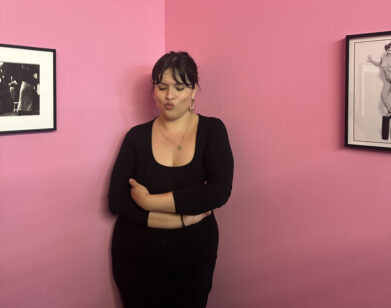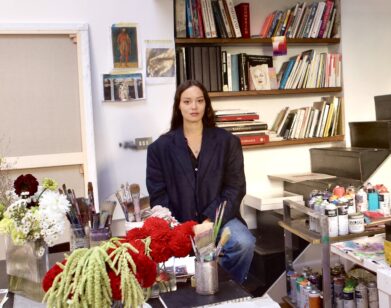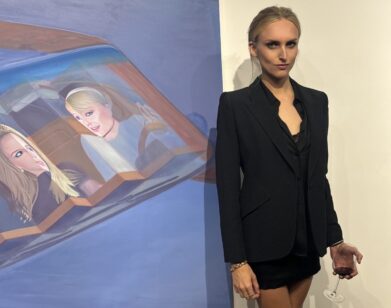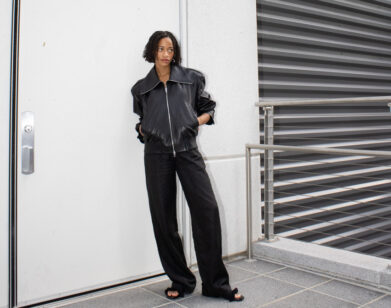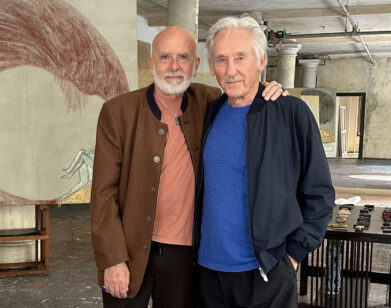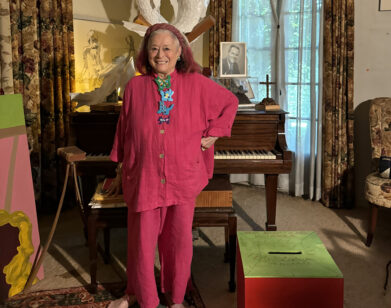Elizabeth Peyton
Elizabeth Peyton has painted the rich, the famous, and the incredibly attractive-particularly that cool, unaffected brand of attractive that is thin, fey, angular, and so often swathed in long, scruffy hair. Since her career took off after her first New York City show in 1988, her subjects have included superhuman icons like Kurt Cobain, David Bowie, Prince William, Napoleon, and John Lennon as well as more immediate flesh-and-bone personalities like downtown artist Spencer Sweeney and designer Marc Jacobs. Even with such celebrated subjects, Peyton’s work could never be described as hedonistic or star-obsessed. Somehow in her pellucid oils and sharp, darting lines, the 43-year-old New York artist has managed to capture a crucial crossroads where the cool public persona transects the fragile being underneath. This past summer, Peyton put on a show of her photographs (many served as source work for her portraits) at the Aldrich Contemporary Art Museum in Ridgefield, Connecticut. The exhibition served as a warm-up for a career retrospective “Live Forever” at New York’s New Museum opening this month. For Interview, Peyton gets on the phone with one of her most striking and consistent subjects, musician Jarvis Cocker. After all, he’s been modeling for her from day one, even if he didn’t know it at the time.
JARVIS COCKER: Are you in New York?
ELIZABETH PEYTON: Yes, I’m at the New Museum. Where are you?
JC: I’m back in Paris. I was in New York last week.
EP: Yeah. I saw you play. At Terminal 5. Did you have a good time at that show?
JC: Yeah, I did. I was a bit nervous because I was playing some new songs, and it’s always nerve-racking when you play new material.
EP: It seemed to go very well. The new songs are very hard rock.
JC: I think it’s probably a midlife-crisis thing. You get to a certain age and you just want to prove that you can still rock that you’ve still got it.
EP: That’s very American.
JC: It’s not like I’m going to start wearing leather and spandex.
EP: No, it’s nice to do that in a suit. It seemed like you were talking a lot more between the songs. Is that something you think about before you go onstage?
JC: Sometimes I’ll write a few topics to speak about during the course of the evening-either things that have happened to me during the day or local things pertaining to the place we’re playing. But that particular night I didn’t. I just thought, I’ll see what happens.
making art is making something live forever. Humanbeings especially-we can’t hold on to them in any way.Elizabeth Peyton
EP: Do you feel a responsibility toward the audience to make them aware of what’s going on in the world?
JC: No. To be honest, I think some abuse their position-really they’re just there to entertain. I speak onstage to try to establish some method of communication. The songs are supposed to be a way of communicating. But speech and drinks and sometimes chocolates are also a way of communicating. Part of why I started a band was due to feelings of shyness and social ineptitude. I saw it as some way of being able to interact with people from a safe distance. It’s always been about trying to get to know people. Albeit, it’s a bit of a contradiction because you can’t really get to know people when they’re 10 feet away and there’s a big mass of them. [Peyton laughs] That leads me to something I was going to ask you. I Googled you to prepare myself for this interview. There were a couple of quotes-
EP: Oh, no.
JC: Don’t worry, nothing bad. One said, “It’s like something I want to see in the world, and then I see it exists in another person. I get so excited that it actually is there.” There was another quote that said, “The fan thing conjures up that something’s missing, that there’s an inadequacy.” We’ve just been talking about how performance is my way of dealing with inadequacy. But you seem to be implying that when you first started painting-and you were painting images from magazines-you were searching for something that was missing from yourself.
EP: I think you mistook that a little bit. It wasn’t something I thought was missing from myself, just something missing in the world. It was something I wanted to know existed—that people could be heroic or could come from anywhere and make great things out of themselves. That’s what I was interested in. Fan always felt too light a word for how I felt about people and what they did. It wasn’t like I felt oppressed by them-more like certain people in the world were doing something very important. I wanted to highlight that. I felt like there weren’t pictures in the world of people who did things like that-pictures which were going to last. Things in museums last longer than pictures in magazines.
JC: That’s how I first heard about you. I’d heard that you’d done a picture of me. Obviously, we’ve met since. I guess you must have met other people that you’ve done pictures of. Does that change your attitude -toward your subjects? Does it spoil the relationship?
EP: No. I don’t think it spoils it at all because I like the really human sides of people. To meet them and see that they’re complicated and weird or shy or any of those things sort of makes it even better—to know that they can rise above that and make something great. I heard that you didn’t like the paintings I made of you. So I was always very shy. [laughs]
JC: Who told you that?
EP: I don’t know. Somehow it was conveyed to me. I don’t mind-it’s fine. But it made me feel more awkward than usual.
JC: No, I was very pleased. Basically I was flattered to know that somebody would bother to do a picture of me.
EP: That brings up something I wanted to ask you. There was that moment onstage at the 1996 Brit Awards with Michael Jackson when you sort of showed him up because he was being such a jerk. [Cocker ran onstage in protest when Michael Jackson was performing.] And then I was thinking about Jay-Z at Glastonbury this year, opening up with “Wonderwall.” [Noel Gallagher of Oasis had previously commented that hip-hop didn’t belong at Glastonbury.] I was thinking how they are very similar things. There aren’t many people who stand up, whether it be in pop or politics, and just say: “Listen, this is dumb. It doesn’t have to be like this.” Right after that awards show, I made a bunch of paintings of you because I really thought that was so heroic.
JC: Part of the reason I did that was because I don’t think people should abuse the fact that they are in showbiz. You still have to be human. I think that’s the point. Showbiz is about showing human things-just amplified, that’s all. And when it gets too much into, “Hey, we’re part of the showbiz club and we can do what we want,” it turns me off and I hate it. The Brit Awards are like the English version of the Grammys. They were just so pleased that they had Michael Jackson, they’d allow him to do anything. Of course they were all kind of secretly saying, “This is really bad taste.” Because he was coming on as if he had the power of healing. It’s not like I’m even religious-I just think that’s wrong. I also thought it was good that Jay-Z didn’t ignore Gallagher’s complaints. He came out and faced them head-on [by covering “Wonderwall”] and made everybody look a bit stupid.
EP: For anyone to exclude anybody who’s making great music-it doesn’t matter what it is-is really dumb. It seems so 200-years-ago.
JC: Speaking of 200 years ago, I found an introduction to some of your work that was shown in a biennial in São Paulo in 1996. There’s a long quotation from a Balzac novel: “A world in which the superfluous is indispensable.” It finishes with this sentence: “Lucien saw that a great gulf separated him from such people and was wondering how to cross it, for he wanted to be like those slim young dilettantes of Paris.” Did you choose that particular piece of writing?
EP: I did. It’s from Lost Illusions. It’s this moment when Lucien’s in a park noticing how well dressed everybody is. He thought he was well dressed himself, but he’s realizing he’s not. I always go back to that because I think it’s so transcendent—not being worried about your clothes, but coming to a big city and being an artist and starting to understand the world. That’s why I used that quote.
JC: It’s this thing of seeing something in other -people which you then aspire to.
EP: Those details aren’t so insignificant. They all add to your individuality, and also how the world looks. They’re like the fabric of the whole, all these little details and choices. I was wondering who makes your suits.
JC: Nobody makes them. I discover them from secondhand places.
EP: Oh really? They fit you really well.
JC: Thank you. [laughs] I know you’ve got an exhibition of photos on at the moment, haven’t you?
EP: Yes. There’s one of you from a concert in Rhode Island.
JC: Obviously you started with pictures that were mainly from magazines. Then you started taking pictures yourself and doing paintings from them. Was it a conscious decision to start taking your own pictures?
EP: It wasn’t conscious. I was beginning to get a lot more interested in the things that were right in front of me and the people I knew. It was also a way of being distant from people, taking pictures all the time. When I look at how many pictures I used to take, I’m amazed because now I really don’t do that. But I would just be clicking pictures all night long.
JC: Did you ever have male groupies? Did thin boys kind of hang around, looking into the middle distance, hoping that maybe you might take a photograph of them and do a picture?
EP: That doesn’t really happen. Maybe once or twice I’ve noticed someone catch my eye who’s kind of thin and pale, but it doesn’t really happen so often. Maybe I don’t notice it. Do you have a lot of that-people wanting to insinuate themselves so you’ll write a song about them?
JC: That doesn’t really happen either. But I don’t really go out much anyway, so I don’t meet that many people.
it is such an amazing moment when people realize what they are and what they can be, and they start putting themselves out into the world. I think you can see it in people when it’s happening. They look different.Elizabeth Peyton
EP: I read once that everything started for you after you fell out of a window while you were trying to impress a girl. You were in the hospital, and that gave you a lot of time to think. And then when you came out, you decided that you wanted your band to be your sole livelihood.
JC: It did happen, yeah. It was a turning point in my life. I’d already had the band. But I fell out of the window, and being bedridden for a month or so gave me time to think. The main thing it altered was that, like a lot of people, I suppose, I had this vague idea that I was going to be an arty person, and I just disregarded my surroundings. There were some strange people in this convalescent ward with me—like people who’d had industrial accidents. It made me realize the actual town and social background that I was from. And suddenly I found that more interesting than looking off into the middle distance thinking I was going to be very deep and aesthetic. I suppose that’s where I changed the focus of what I wrote about. I tried to write more about everyday things and in some way dramatize the small details of life, rather than trying to do some kind of epic, all-encompassing artistic gesture. It’s like you saying that sometimes people think little details aren’t that important.
EP: I think little things are more powerful because they’re more honest, so people feel them more strongly. I wanted to ask you if you felt what you do could change the world? I know that’s a real cliché question. But do you feel that making something very personal and singing about it can change the world that you live in?
JC: [sighs] I do write songs with a political dimension to them sometimes, but I’m always slightly appalled by it when I do.
EP: But what about the songs that are very personal, such as “I Love Life”? Things like that are really joyous. It can be very political in a way because it’s promoting a kind of individuality.
JC: I think that’s what all art is for—for people to express what it is to be human. That’s the purpose of it. I’ve been reading Ernest Hemingway recently. There was one really good quote—I can’t really remember it word for word, but it’s something like: You were in it and you were part of it and you breathed it and you expressed it.
EP: The Pulp album that came after This Is Hardcore called We Love Life–that’s so joyous. This Is Hardcore was dark. And then it seemed like you found trees and nature and life. It’s like the sun came out. Did something very dramatic happen?
JC: It was just kind of, like, having not died. [laughs]
EP: Wow. Did you think you were going to die?
JC: Um, I did until the record company tried to get life insurance on me. They wanted to take out life -insurance in case I died so that they would get some kind of return on their investment. And I said, “Are you going to take out some for me then as well?”—like, if I died, my girlfriend or my family would get some money. And they said, “Oh, no, that’s for you to do.” So then I thought, God, I can’t even commit suicide now because then it’d just benefit them. So I thought, Well, maybe that’s good, so I’ll stay alive. And once you’ve decided to stay alive, then you may as well . . . It’s all very well just deciding not to die; then you have to work out how to live. I suppose that record was a bit “hello grass, hello trees,” kind of childish, but also a way of saying, “Okay, I’ll give it another go.” Now I’ll fire one last quote at you. I saw a picture that you’d done of Keith Richards recently. And this quote was attributed, saying you were interested in the particular moment when they’re about to become what they will become, when their image takes on a life of its own. To me that seems to imply that in some ways in your -pictures what you’re trying to do is capture a very specific and maybe very fleeting moment.
EP: There are different moments that I’m interested in. But I think it is such an amazing moment when people realize what they are and what they can be, and they start putting themselves out into the world. I think you can see it in people when it’s happening. They look different.
JC: The outside of people reflects what’s going on inside-
EP: But why wouldn’t it? I think that there are so many things going on in people all the time, and all these thoughts and decisions come out in your decision-making and how you look. But I think also there are things in your facial expressions that reflect it, too. I think everybody can be beautiful. Anybody can have beauty. It’s about how you look at the world, in a way, and how you treat yourself. I have a question: Do you dance a lot at home? [Cocker laughs] If so, do you do it in front of the mirror?
JC: No, I don’t dance at home now.
EP: You don’t? You have a lot of energy.
JC: Yeah, that’s ’cause I don’t dance at home, so I’ve built it up. It’s like a safety valve, an explosion. I don’t dance as much as I used to. I used to go to clubs and things like that, and I enjoyed dancing a lot. I mean, I was at a wedding two or three weeks ago, and that’s the first time I’ve kind of danced socially for over a year. I really enjoyed it.
EP: Because when you’re onstage, you’re kind of dancing by yourself.
JC: Yeah, I’m like Billy Idol. That’s something that I’ve never consciously thought of. When I was first onstage, I was quite static. Then I think I freaked out once because my guitar broke or something. And I kind of jumped around, and then people clapped. And then I realized that I could do it, and they actually enjoyed it as well. And so it’s carried on from that. I’ve never worked on any moves. One thing I’d like to ask you about: How do you choose who you’re going to paint?
EP: I don’t really choose. It just sort of has to happen. I start listening to something or I’m seeing somebody a lot or seeing their art. And then I just really want to make a picture of them. Lately I’ve been making a lot of still lifes. That sort of works in the same way too, as do pictures of the city. Like, I’ll get stuck on a building and want to make a picture of it.
JC: You’ve got this big show coming up at the New Museum. The title of the exhibition is “Live Forever.” Obviously, I know the reference because of the Oasis song.
EP: That’s what it’s all about-making art is making something live forever. Human beings especially—we can’t hold on to them in any way. Painting and art is a way of holding onto things and making things go on through time.
JC: That’s a very nice way to think of painting, as preserving moments. That’s the frustrating thing about life. You have these peak experiences when every-thing seems to align. But then 10 minutes later it’s gone. It’s a nice feeling to thin that through painting, that moment does exist forever.
EP: I’ve been working from life a lot in the last few years, and one big element of the picture is just a record of two people being in the same place at the same time—which can be very powerful. It can just be huge.
JC: Can I ask my final question? Have you ever seen the film Hannah and Her Sisters [1986]?
EP: Yeah, I have.
JC: Do you think you look like the actress? [Peyton laughs] You know, Dianne Wiest. Has anybody said that to you before?
EP: Yeah, people ask me that all the time.
JC: I think, generally, the two of you look quite similar. Obviously, she’s a lot older than you. But that’s meant as a compliment. I saw that film the other day, and I was thinking, God, she really reminds me of somebody. And then I realized that it was you.
EP: Around the eyes especially, we have a similarity.
JC: I’m glad I’m not the first one. One thing I thought was interesting is that this is for Interview magazine, which, of course, was started by Andy Warhol. I guess people have drawn parallels between you and him—because of the way you deal with celebrity. I wondered whether you’d thought that held any water?
EP: First of all, there aren’t many artists who actually make portraits of people, period. But I’m not interested in celebrity at all. I’m really interested in what people do. And I think that was something that was always in Interview. It was, you know, what people do, from the most minute thing, like: What did you have for breakfast? What are you working on? Those interviews have such a human texture to them.
JC: It’s going back to what we were talking about earlier—what people choose to do with their lives. The little quirks, the details.
EP: What are you doing the rest of the afternoon?
JC: I’m going to go to a supermarket down the road called Shopi. I’ve got a shopping trolley, which has got this ingenious three-wheel mechanism that allows it to go up and down curbs very easily. I enjoy using it a lot. What are you going to do? It’s early for you, isn’t it? Like midday or something?
EP: Yeah, I have the whole day ahead of me.
JC: Seize the day.
EP: Exactly.

